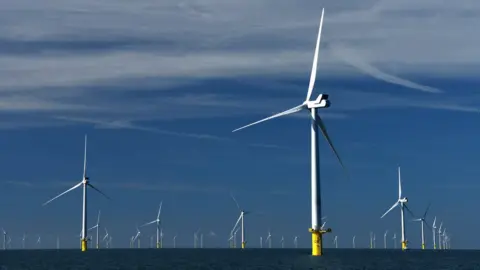Climate change: Offshore wind expands at record low price
 Getty Images
Getty ImagesA record amount of new offshore wind power has been announced in the UK.
The new projects will power more than seven million homes at a lower-than-expected cost.
The government says the wind farms represent a breakthrough, typically generating electricity without subsidy.
Environmentalists are delighted - but they warn ministers are failing to tackle more difficult challenges such as driving and home heating.
They point out that electricity usage forms just 15% of household energy consumption - behind petrol, diesel and gas.
Friday's announcement offers a guaranteed price to firms willing to take the risk of installing costly offshore wind turbines in projects set to be delivered by 2025.
The cheapest operator will provide power for as low as £40 per megawatt hour.
By comparison, power from Hinkley Point C - the new nuclear power station in Somerset also due to open in 2025 - is expected to cost £92.50 per megawatt hour. (Note that the prices quoted for these index-linked contracts are all in 2012 prices.)
John Sauven, executive director of Greenpeace, said: "Today's news makes arguing for the massive public subsidies nuclear power requires a much harder task."
The government anticipates the overall wholesale electricity price will range between £48.95 in 2023-24 to £52.36 per megawatt hour in 2026-27.
The cost of offshore wind has plummeted about 30% in the last two years.
Greenpeace campaigner Kaisa Kosonen tweeted: "Impossible is becoming possible in front of our very eyes."

For more facts about how our energy consumption needs to change to help fight climate change, download your BBC Briefing on energy. BBC Briefing is a new mini-series of online guides to the key issues in the news.

Prime Minister Boris Johnson said: "The UK is leading the way in the fight against climate change, and it's great news that millions more homes will be powered by clean energy at record low prices.
"Seizing the opportunities of clean energy not only helps to protect our planet, but will also back businesses and boost jobs."
His critics point out that de-carbonising the electricity sector is accepted as the easy part of tackling climate change.
The government has been repeatedly criticised by MPs for failing to curb emissions from transport and homes - and for not acknowledging that to curb climate change, many drivers need to leave their cars at home and walk, cycle or go by public transport.
